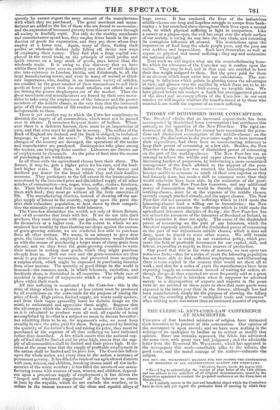THEORY OF DIMINISHED HOME CONSUMPTION.
THE Standard admits that an increased export-trade has been accompanied by diminished home consumption ; but attributes this anomaly to the operation of the New Poor-law. The rigid en- forcement of the New Poor-law cannot have occasioned the priva- tions and diminished consumption of the middle-classes : on the contrary, the diminution in the poor-rates ought to have increased their expenditure, had there been no counteracting influence to keep their power of consuming at a low ebb. Besides, the New Poor-law was the consequence of diminished power of consuming on the part of the working-classes. The New Poor-law was an attempt to relieve the middle and upper classes from the yearly increasing burden of pauperism, by introducing a more economical management of the funds allotted to the support of the poor. Before the New Poor-law was enacted, the labouring-classes had become unable to consume as much at their own expense as they had formerly done, but made a shift to consume inore than they would otherwise have been able, by the assistance of the poor- rates. Repeal the New Poor-law tomorrow, and any additional power of consumption that would be thereby obtained by the working-classes, must be at the expense of the middle classes, severely enough pinched already, and the upper classes. The New Poor-law did not occasion the sufferings which in 1819 made the labouring-classes lend a willing ear to incendiaries : the New Poor-law did not occasion the sufferings which in 1830 made the agricultural labourers disciples of Swing : the New Poor-law has not stinted the commons of the labourers of Scotland or Ireland, to which countries it does not apply. The cause of the diminished power of consuming on the part of our labourers, which the Standard expressly admits, and the diminished power of consuming on the part of our industrious middle classes, which it does not deny, must be traced to some other source. We still remain of opinion that it is owing to our restrictive policy, which pre- vents the field of profitable investment for our capital, skill, and labour, expanding as rapidly as these sources of production.
Our proof that this is the state of matters, we rest upon two notorious facts,—that for a series of years the labouring population has not been able to find sufficient employment, notwithstanding there is more capital in the country than would set them all to work ; and that for a series of years the manufacturers have been exporting largely on commission instead of waiting for orders, al- though the goods thus exported are most frequently sold at a great loss. The Standard is mistaken when it supposes we adverted merely to a disproportion of exports and imports in the years 1838-9: we referred to those years to show that more goods were exported in the latter year than in the former, although less had been manufactured, simply for the purpose of showing the fallacy of using the sounding phrase " multiplied trade and commerce" when nothing more was meant than an increased amount of exports.


























 Previous page
Previous page